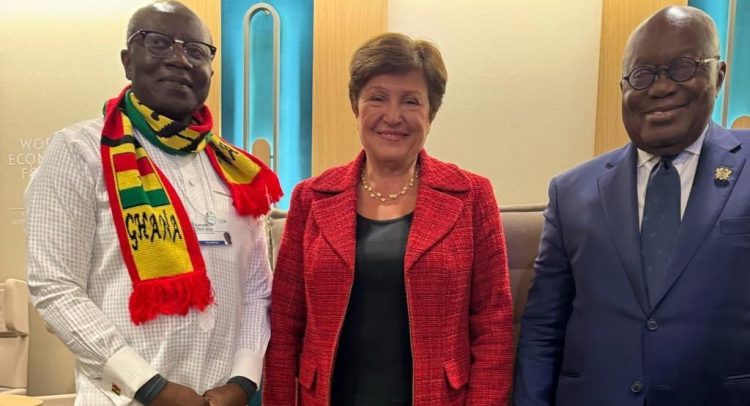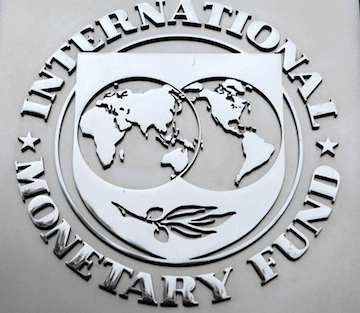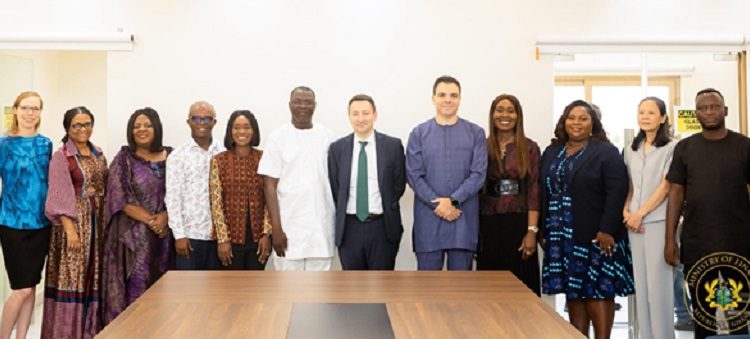
Governor of the Bank of Ghana (BoG), Dr Ernest Addison, has expressed optimism that the successful second review of the programme with the International Monetary Fund (IMF) will lead to the release of the 3rd tranche.
The country had already received two tranches, $600million each. The release of the third tranche would increase the total disbursements so far to US$1.56 billion.
At a joint IMF, Ministry of Finance, BoG press conference in Accra on Friday, April 13, he stated that the BoG, MoF have shown steadfast commitment to a set of policies right from the beginning of the programme under very difficult circumstances.
“We have reached a stage where programme implementation is progressing well. We completed the first review of the External Credit Facility (ECF) programme in the latter part of last year and today we are at the verge of completing the second review with the steadfast implementation of our policy measures,” he said.
He added “We are happy that this effort has not been in vain and we are ending the Mission with a Staff-Level Agreement, which we hope will translate into a Management and Executive Board approval for the release of another tranche of IMF support.
Dr Addison further assured the IMF that efforts are being made to ensure that the programme is not negatively affected in this year which happens to be an election year.
Dr Addison noted that in Ghana’s recent history, the country has not been able to successfully implement an IMF-supported programme in an election year without derailment.
But “the Government and the Central Bank are committed to changing that narrative.”
“We recognize the importance of continued macroeconomic stability and an early return to the capital markets, and we will remain committed to ensure that programme implementation stays firm,” he said.
Below is his full address during the press conference…
Thank you Stephane for those opening remarks.
. Let me also thank you and your team from the IMF, who have spent the last two weeks with us pouring over numbers and discussing matters to move our economy forward. We are happy that this effort has not been in vain and we are ending the Mission with a Staff-Level Agreement, which we hope will translate into a Management and Executive Board approval for the release of another tranche of IMF support.
2nd review: Ministry of Finance, BoG and IMF team had a fruitful opening meeting – Amin Adam
We have shown steadfast commitment to a set of policies right from the beginning
under very difficult circumstances and we have reached a stage where programme
implementation is progressing well. We completed the first review of the ECF programme in the latter part of last year and today we are at the verge of completing the second review with steadfast implementation of our policy measures.
With substantial progress in these measures, we are beginning to reap substantial macroeconomic dividends. Inflation has dropped significantly from a peak of 54 percent at end of 2022 to 23 percent in 2023. The exchange rate remained relatively stable throughout last year, supported by tighter monetary policy and stronger foreign exchange reserves. Economic growth surprised on the upside.
During the first quarter of this year, this progress has continued although we have witnessed some slowdown in the pace of disinflation primarily due to a variety of factors including adverse base drift effects. The expectation however is for the disinflation process to resume in the second quarter of 2024 and beyond driven by continued maintenance of a tight monetary policy stance. Our expectation for end year inflation of 15 /- 2% remains unchanged.
We have also continued to strengthen our foreign exchange reserve buffers and our current account balance has improved. Despite the delays in disbursement of some donor support, our foreign exchange reserves have remained steady and is reported at $6.2 billion as of 5th April 2024. We will continue to implement the policies that have helped sustain that progress including the innovative Gold for Reserves programme, which has acted as a game changer in our foreign exchange management strategies.
During the period while the mission was here, we have also addressed some burning issues including the impact of the DDEP on the balance sheet of the Bank of Ghana and we have reached broad understanding on early recapitalization of the Bank of Ghana and a Memorandum of Understanding between the Bank of Ghana and the Ministry of Finance will be signed to this effect.
We have also discussed progress in the External Debt restructuring programme of the Government and the ongoing discussions with Commercial Creditors, Bondholders and bilateral creditors.
Overall on all sides, we have reached the conclusion that we must continue with steadfast programme implementation of policies, continue with the fiscal rectitude, continue with the tight monetary policy stance, and pursue the necessary structural reforms to underpin the sustainability of the progress we are making. On the Fund’s side, we expect some degree of flexibility to reflect changing dynamics in the Ghanaian economy.
To conclude, in Ghana’s recent history, we have not been able to successfully implement an IMF-supported programme in an election year without derailment. The Government and the Central Bank are committed to changing that narrative. We recognize the importance of continued macroeconomic stability and an early return to the capital markets, and we will remain committed to ensure that programme implementation stays firm.
The post IMF deal: Addison expresses optimism that 2nd review will lead to release of 3rd tranche first appeared on 3News.
Read Full Story
























Facebook
Twitter
Pinterest
Instagram
Google+
YouTube
LinkedIn
RSS